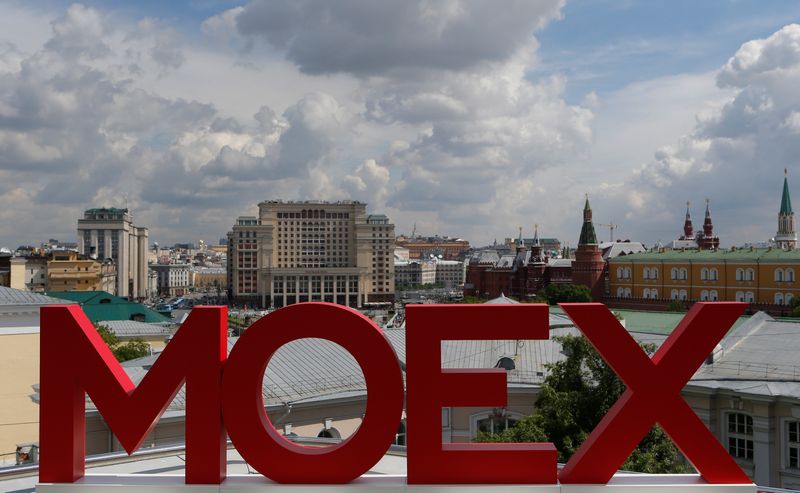(Reuters) -The rouble extended recovery gains on Friday, hitting its strongest since early March against the dollar, while stocks fell in their second day of trading after a near month-long suspension, with losses led by flag carrier Aeroflot.
The Russian market is gradually reopening and returning to normal after a suspension caused by sweeping Western sanctions that followed the beginning of what Russia calls "a special operation" in Ukraine on Feb. 24.
The rouble, which hit a record low in Moscow of 120 earlier in March, firmed to 92.04 to the greenback, a level last seen on March 1. It also climbed past the psychologically important threshold of 100 to the euro.
As of 1356 GMT, the rouble pared some gains and was 0.3% stronger at 96.52 to the dollar and added 1% to trade at 105.75 against the euro.
The response to events in Ukraine has ripped Russian financial markets from global networks and sent the rouble tumbling, although it was on course for five consecutive sessions of growth, heading for a weekly gain of up to 10%.
Foreign investors cut their exposure to Russia, with non-residents' share among holders of OFZ treasury bonds falling to its lowest since late 2012 as of March 1.
The rouble received a boost on Wednesday after Putin said Russia would start selling its gas to "unfriendly" countries in roubles.
Fewer imports to Russia, the exodus of Western companies and Putin's switch to roubles for gas exports are all positive for the Russian currency, Commerzbank (DE:CBKG) analysts said in a note.
"A return to the old pre-war (rouble) strength is nonetheless unlikely," they said, pointing to the effect that lower demand and shrinking exports will have.
In offshore markets, the rouble was trading at about 99 to the dollar, weaker than in Moscow, where cash purchases of foreign currency are restricted.
STOCKS TURN SOUTH
Airline Aeroflot lost more than a quarter of its value over two days to plunge to its lowest since 2009 as securities slid lower across the board on Friday after many blue chips posted double-digit gains on Thursday.
Shares in Aeroflot dropped 18.2% to its weakest point since early 2009, adding to Thursday's 16% loss.
The benchmark MOEX stock index closed 3.7% lower at 2,484.13 points. It had closed 4.4% higher on Thursday.
The dollar-denominated RTS index fell 2.7% to 829.6 points.
Prior to Thursday, stocks had not traded on Moscow's bourse since Feb. 25, the day after Russian President Vladimir Putin sent thousands of troops into neighbouring Ukraine.
The move prompted Western sanctions aimed at isolating Russia economically, and Russian countermeasures.
On Friday more securities, including corporate bonds and Eurobonds, were being traded in another short session, and restrictions on trading by foreigners alongside a ban on short selling remained.
State lenders Sberbank and VTB fell 3.5% and 7.9% respectively.
Oil major Rosneft and mining giant Nornickel were exceptions, gaining 1.4% and 0.4%.
RUSSIAN RESPONSE
The central bank on Friday said restrictions imposed on capital flows were a tit-for-tat move after its reserves were frozen by Western countries.
"In response to the freezing of part of Russia's reserves, Russia also introduced restrictions on the movement of funds that could be transferred to unfriendly countries by a comparable amount," the central bank said.
Moscow is now looking to friendlier markets. Andrei Kostin, chief executive of VTB, whose activities have been hit by sanctions, said opportunities would arise elsewhere and that his lender was offering accounts to Russians in Chinese yuan.

"We have already deposited the equivalent of 16 billion roubles in yuan, citizens are already depositing, and there are other currencies of neighbouring states," he told RBC TV.
Dominant lender Sberbank said late on Thursday it expects trade turnover and settlements of the rouble-yuan pair on Moscow Exchange to increase.